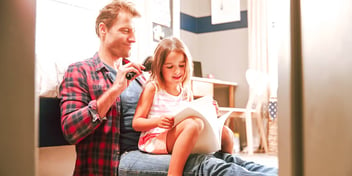5 Ways Your Kids Might React to Your Divorce

Divorce is a significant event in a child's life. It can elicit a range of reactions, from self-blame to regression. As a loving parent, it’s wise to prepare yourself for whatever may come with your kids so you can help them.
While it's possible that a child might not have much of a reaction if the split is uneventful and amicable, usually divorce has at least some kind of impact on them, at least short-term. Here are five of the most common reactions seen in children of divorce so you know what to expect and how to handle each.
1. Regression
It's not unusual for children to revert to earlier behaviors following a divorce. This could manifest as bedwetting, thumb-sucking, or seeking a security blanket. While alarming, understand that this is your child's way of coping with change. Maintain routines, offer reassurance, and give them time to adjust.
2. Anxiety
Children may feel uncertain about their future post-divorce. They may worry about living arrangements, school changes, or losing contact with a parent now that the family structure has changed. Open communication is key here. Discuss changes honestly but sensitively, reassuring them that their divorced parents will always care and remain involved in their lives.
3. Depression
Some children might internalize their feelings, leading to sadness or withdrawal. If you notice signs of depression, such as loss of interest in activities or changes in sleep or appetite, professional help may be needed. Don't hesitate to seek guidance from a mental health professional.
Divorce affects children. Read our article, Understanding and Protecting Kids’ Mental Health in Divorce, for more information.
4. Irritability and non-compliance
Divorce can lead to frustration and anger, resulting in defiant behavior. This can be challenging to handle, but try to respond with patience and understanding. Set clear boundaries and consequences, but also allow space for them to express their feelings.
5. Social and school problems
Changes at home can spill over into a child's social life and academic performance. They may struggle with friendships, grades, or behavioral problems. Adolescents may experiment with substance use, which could turn to substance abuse. They may engage in sexual activity as a way of dealing with this parental conflict.
Inform the school about the situation so they can provide additional support. Encourage your child to communicate their feelings, and reassure them it's okay to ask for help. If your child’s safety is in jeopardy, or if they are at risk for mental or physical health problems, you may need to do more.
Co-parenting for your child’s well-being
Co-parenting, when done right, can be a silver lining in the cloud of divorce. Successful co-parenting looks different for every divorced couple, but essentially, it's about setting aside your personal differences with your ex-spouse and focusing on your child's well-being.
Healthy co-parenting matters. It's not just about scheduling or logistics; it's about providing stability, minimizing conflict, and modeling mature problem-solving. When children see their parents working together, they learn resilience. They understand that love for them transcends marital ties.
So, how can you nail co-parenting?
- Communicate with your co-parent. It may be easier said than done, but open, respectful communication sets the stage for successful co-parenting. Keep discussions child-focused. Consider using tools like co-parenting apps to streamline communication and avoid misunderstandings.
- Give your child consistency. Consistent rules, routines, and discipline across both households provide kids living in two different homes with a sense of security. It tells them what to expect, which can reduce anxiety.
- Support each other. You and your ex may no longer be together, but you’re still on the same team when it comes to your child. Speak positively about each other in front of your child. Support each other's roles and relationships with the child.
- Stay flexible. Plans change, and life happens. Be willing to swap weekends or adjust schedules with your co-parent as needed. Flexibility reduces stress, and it shows your child that co-parenting can work smoothly.
Read: Parenting Coach Elisabeth Stitt on Co-Parenting Success
Getting help for your child
Sometimes, the emotional impact of divorce on children can exceed a parent's capacity to manage alone. This is not a failure. Your job is to be aware of the effects of divorce on children and to monitor your child for signs that they need additional support. So, let's discuss when and how to seek professional help.
If your child displays prolonged signs of distress such as persistent sadness, drastic changes in behavior or academic performance, or mentions of self-harm, it's time to look for professional intervention. You might start with their pediatrician or school counselor; this person can point you in the direction of someone who is college-trained to help you and your child deal with the negative effects of divorce on kids.
Engaging a child psychologist or licensed counselor may be best. These professionals can offer therapeutic interventions like cognitive-behavioral therapy, play therapy, and family therapy. The experience they offer will be tailored to your child’s developmental needs.
Support groups are also helpful. Support groups for kids offer a safe space for young people to express their feelings and learn from peers who are experiencing similar situations. You might want to join a support group, too. We like to recommend Circles, an online platform that provides the opportunity for many different types of social support.
Seeking help isn't a sign of weakness; it's an act of love. Your child's emotional well-being is paramount. Sometimes, they need a little extra help to understand and manage their feelings. It's okay to reach out and ask for help.
FAQs
How might young children react to divorce?
Young kids may show clinginess, regress in behavior, or have trouble separating from parents. They often need extra reassurance and consistency.
How do school-aged children respond to divorce?
School-aged children may struggle with guilt, believing the divorce is their fault. They can also show anger, sadness, or act out at school.
What reactions are common in teens during divorce?
Teens may withdraw, test boundaries, or become protective of one parent. They often crave honesty and input in decisions that affect their lives.
Can kids blame themselves for divorce?
Yes, many children assume responsibility for family conflict. Parents should reassure them consistently that the divorce is not their fault.
What signs suggest a child is struggling after divorce?
Warning signs include withdrawal, declining grades, changes in sleep or eating, or persistent anger. Professional support may help if these signs continue.
How can parents best support their kids through divorce?
Keep routines steady, encourage open expression, avoid putting kids in the middle, and provide age-appropriate explanations about the changes.
How to Support Your Kids Through Their Reactions to Divorce
Observe your child’s behavior
Notice changes in mood, school performance, or social interactions that may signal distress.
Provide reassurance
Remind children often that the divorce is not their fault and that both parents love them.
Keep routines stable
Stick to familiar schedules for meals, bedtime, and school to give kids a sense of security.
Encourage expression of feelings
Allow children to share emotions through talking, drawing, or activities without judgment.
Limit conflict in front of kids
Avoid arguments and keep communication with your co-parent calm and business-like.
Seek professional help if needed
If distress continues, reach out to a therapist, counselor, or school support staff.
Suggested: A Kid with Two Homes: A Child’s Perspective on Divorce
Resource
Parenting Coach Elisabeth Stitt on Co-Parenting Success. Hello Divorce interview with CEO Erin Levine.Supporting Kids During a Divorce. Child Mind Institute.



